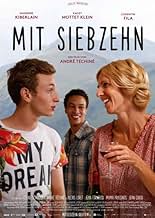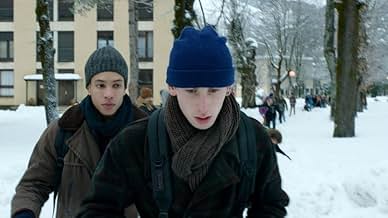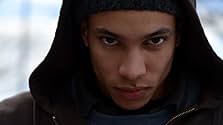Quand on a 17 ans
- 2016
- Tous publics
- 1h 54min
NOTE IMDb
7,2/10
7,6 k
MA NOTE
Damien vit avec sa mère Marianne, une docteure, tandis que son père est en service militaire à l'étranger. Il est harcelé par Thomas, dont la mère est malade. Les garçons doivent vivre ensem... Tout lireDamien vit avec sa mère Marianne, une docteure, tandis que son père est en service militaire à l'étranger. Il est harcelé par Thomas, dont la mère est malade. Les garçons doivent vivre ensemble quand Marianne décide de recueillir Thomas.Damien vit avec sa mère Marianne, une docteure, tandis que son père est en service militaire à l'étranger. Il est harcelé par Thomas, dont la mère est malade. Les garçons doivent vivre ensemble quand Marianne décide de recueillir Thomas.
- Réalisation
- Scénario
- Casting principal
- Récompenses
- 2 victoires et 12 nominations au total
Avis à la une
I wasn't really sure what to except out of this film, but to classify it as simply an LGBT film would be a great disservice to what it's doing. There aren't just two leads here, there are three, and that is crucial to the importance of it. The screenplay is layered and filled with small gestures and moments that mean a lot to the characters, but ones we have to be attentive to. This is a little film made out of moments like that and if people aren't used to it and don't like that kind of storytelling, they may not take to this film. It's subtle and very nuanced where it counts, and that's why it stands apart from the rest of its like.
I didn't quite know what to expect with this one so I just let myself get into the story and I have to say, I was not disappointed. It starts slowly and evolves into a complex and layered plot about 2 boys discovering their sexual desires but unlike many movies on that subject, it's not just about one thing.
What made this movie work in my opinion is the subplot involving Damien's mother played very well by Sandrine Kiberlain who gives a subtle performance. The standout to me in terms of acting is without a doubt Corentin Fila as Thomas Chardoul, the perplexed, confused and prone to violence teenager who keeps everyone at bay while yearning to be himself.
I must say I also enjoyed Kacey Mottet Klein's performance as Damien Delille even though he seemed a bit less able to convey the angst and subtle emotions needed for the part. His acting was sometimes clumsy and a bit fake but is still worked because it could be read as choices he made on how to play the part and the fact that he truly is a teenager playing one, not an adult actor trying to go back to his youth.
Even the ending worked for me so a strong 8 star rating is what I felt it deserved and if you speak French and want to spend some time getting to know these characters, they all have something to offer and I for one enjoyed the journey and can safely recommend it warmly.
What made this movie work in my opinion is the subplot involving Damien's mother played very well by Sandrine Kiberlain who gives a subtle performance. The standout to me in terms of acting is without a doubt Corentin Fila as Thomas Chardoul, the perplexed, confused and prone to violence teenager who keeps everyone at bay while yearning to be himself.
I must say I also enjoyed Kacey Mottet Klein's performance as Damien Delille even though he seemed a bit less able to convey the angst and subtle emotions needed for the part. His acting was sometimes clumsy and a bit fake but is still worked because it could be read as choices he made on how to play the part and the fact that he truly is a teenager playing one, not an adult actor trying to go back to his youth.
Even the ending worked for me so a strong 8 star rating is what I felt it deserved and if you speak French and want to spend some time getting to know these characters, they all have something to offer and I for one enjoyed the journey and can safely recommend it warmly.
10Alger_P
This movie is the best-directed contemporary gay love story I've ever seen. It doesn't over- dramatize the stigma that all gay youth deal with when coming out to themselves and others, but it doesn't pretend such stigma isn't important. It presents attraction and love and friendship and family and desire as the complexly interwoven mess that it always is, but is so rarely seen in media. It shows love as not the solution to all your problems, but also that it doesn't have to be tragic. It portrays traditional families charitably, alongside gayness - they don't have to be natural enemies, but they have different dynamics which are usually either ignored or treated one-dimensionally. Most importantly, this film describes coming out as it really is: a profoundly individual act, and usually played out non- tendentiously and in a narrative completely unique to that individual. Most coming out films I've seen swerve into clichés and predictable outcomes. Although this film's plot resolution is fairly conventional, somehow the characters' authenticity, uniqueness and vulnerability fulfilled the story in a deeply touching, yet unsentimental way. Bravo.
If you're not gay, you might think this movie is nothing special, the way some straight people I know thought Brokeback Mountain was tripe, not paying any attention to the repression central to that story. The moving qualities in this film are mostly a coming-out thing, so perhaps straight people won't relate, but there are glimmers here (and in our times) of that narrative holding enough substance to speak to universal truths.
If you're not gay, you might think this movie is nothing special, the way some straight people I know thought Brokeback Mountain was tripe, not paying any attention to the repression central to that story. The moving qualities in this film are mostly a coming-out thing, so perhaps straight people won't relate, but there are glimmers here (and in our times) of that narrative holding enough substance to speak to universal truths.
Bullying normally leads to lasting enmity between the perpetrator and the victim. Only occasionally does it lead to friendship. Rarely does it lead to love, but such is the case in André Téchiné's ("In the Name of my Daughter") masterful coming of age drama, Being 17 (Quand on a 17 ans), his best film since the 1994 "Wild Reeds." Co-written by director Céline Sciamma ("Girlhood") and set in the Pyrenees Mountains in the South of France, the film opens with the sight of a lonely boy trudging through winding snow-covered mountain roads on his way to school, a journey partly on foot and partly by bus that takes him an hour and a half each way.
The boy is Thomas Charpoul (Corentin Fila), a biracial Algerian boy of seventeen who has been adopted by a white farming family and whose feeling of alienation from his parents, Jacques (Jean Fornerod, "Polisse") and Christine (Mama Prassinos, "Leaving") carries over to his behavior at school. Usually, one of the last to be picked for a basketball team in gym class, Tom's anger finds an outlet when he deliberately provokes another classmate Damien Delille (Kacey Mottet Klein, "Keeper"), tripping him as he goes back to his seat after reciting a poem by Rimbaud in front of the class and shoving him to the ground after school.
Damien is a tall, slender boy who could not be more different than his nemesis. He is a committed student, emotionally stable, and close to his mother Marianne (Sandrine Kiberlain, "Encore Heureux"), the only doctor in the small town. As performed by Kiberlain, she is a three-dimensional figure whose warmth and humor light up the screen and the film is her story as well as that of the two boys. Damien's father Nathan (Alexis Loret, "In Harmony"), is an Army pilot who is engaged in an unspecified conflict in the Middle East, but is away from home often and but plays a strong role in the Damien's life. Not cowed, Damien takes lessons in self defense from family friend Paulo (Jean Corso, "In the Name of my Daughter") and plans to retaliate but circumstances change the dynamics.
When Marianne visits Christine to treat her pulmonary infection, she discovers that her patient is pregnant. Unaware of the conflict between the boys, she invites Thomas to stay at their house during his mother's pregnancy so that he can keep up his grades. While on the surface it is a decision that seems contrived except that Marianne has dreams about having an affair with Tom. Though the violence between the boys continues even as they share the same house, Damien recognizes new feelings when he sees Tom take off his clothes and dive naked into a lake in the middle of winter.
Startled by his physical attraction, he tells him later that "I need to know if I'm into guys or just to you," but the answer remains unclear and their homoerotic relationship only develops after an initial period of fear and confusion. What stands out in Being 17 is the naturalness of the two boys and the chemistry they have together. This authenticity extends not only to the way they speak to each (neither are very vocal) or look at each other but to their body language even when they are fighting, as if they are happy to be receiving the others attention. Not enough can be said about the work of Klein and Fila. Their performances resonate with conviction and create a uniquely moving experience.
The boy is Thomas Charpoul (Corentin Fila), a biracial Algerian boy of seventeen who has been adopted by a white farming family and whose feeling of alienation from his parents, Jacques (Jean Fornerod, "Polisse") and Christine (Mama Prassinos, "Leaving") carries over to his behavior at school. Usually, one of the last to be picked for a basketball team in gym class, Tom's anger finds an outlet when he deliberately provokes another classmate Damien Delille (Kacey Mottet Klein, "Keeper"), tripping him as he goes back to his seat after reciting a poem by Rimbaud in front of the class and shoving him to the ground after school.
Damien is a tall, slender boy who could not be more different than his nemesis. He is a committed student, emotionally stable, and close to his mother Marianne (Sandrine Kiberlain, "Encore Heureux"), the only doctor in the small town. As performed by Kiberlain, she is a three-dimensional figure whose warmth and humor light up the screen and the film is her story as well as that of the two boys. Damien's father Nathan (Alexis Loret, "In Harmony"), is an Army pilot who is engaged in an unspecified conflict in the Middle East, but is away from home often and but plays a strong role in the Damien's life. Not cowed, Damien takes lessons in self defense from family friend Paulo (Jean Corso, "In the Name of my Daughter") and plans to retaliate but circumstances change the dynamics.
When Marianne visits Christine to treat her pulmonary infection, she discovers that her patient is pregnant. Unaware of the conflict between the boys, she invites Thomas to stay at their house during his mother's pregnancy so that he can keep up his grades. While on the surface it is a decision that seems contrived except that Marianne has dreams about having an affair with Tom. Though the violence between the boys continues even as they share the same house, Damien recognizes new feelings when he sees Tom take off his clothes and dive naked into a lake in the middle of winter.
Startled by his physical attraction, he tells him later that "I need to know if I'm into guys or just to you," but the answer remains unclear and their homoerotic relationship only develops after an initial period of fear and confusion. What stands out in Being 17 is the naturalness of the two boys and the chemistry they have together. This authenticity extends not only to the way they speak to each (neither are very vocal) or look at each other but to their body language even when they are fighting, as if they are happy to be receiving the others attention. Not enough can be said about the work of Klein and Fila. Their performances resonate with conviction and create a uniquely moving experience.
So this is what being 17 feels like?! This is a slow-moving, mundane yet beautiful, subtle drama that captures the bleak lives of two teenage boys, both living in different family backgrounds. Accompanied by constant shivering snowfalls, they both end up feeling 'something' between them.
This is a simple come-of-age story that doesn't show us usual intensity of gay relationships or obvious flow of surging passion (that concludes with I-love-you or I-like-you confessions). On the contrary it is more about wavering confusion and love-hate tension that grows between two adolescent boys studying in the same institute.
What makes it different from other gay films of similar themes is its ability to grip your attention and tease you with slightly puerile curiosity about: "will they come together?"
There are several unique elements that work as essentials of this story: sense of solitude, fierce jealousy, suppressed infatuation, silent expectations, teenage ego, and of course, the urgent hatred that often emerges from helpless, pent-up affection.
I especially loved the natural, engaging and poised performances of two young actors who seemed to know what they were supposed to do on screen - they appeared quite involved and effortless. Exhilarating indeed!
This is a simple come-of-age story that doesn't show us usual intensity of gay relationships or obvious flow of surging passion (that concludes with I-love-you or I-like-you confessions). On the contrary it is more about wavering confusion and love-hate tension that grows between two adolescent boys studying in the same institute.
What makes it different from other gay films of similar themes is its ability to grip your attention and tease you with slightly puerile curiosity about: "will they come together?"
There are several unique elements that work as essentials of this story: sense of solitude, fierce jealousy, suppressed infatuation, silent expectations, teenage ego, and of course, the urgent hatred that often emerges from helpless, pent-up affection.
I especially loved the natural, engaging and poised performances of two young actors who seemed to know what they were supposed to do on screen - they appeared quite involved and effortless. Exhilarating indeed!
Le saviez-vous
- AnecdotesThe film's title is derived from the first verse of Arthur Rimbaud's 1870 poem "Roman": "On n'est pas sérieux quand on a dix-sept ans" ("When you are seventeen you aren't really serious"). Additionally, the poster's tagline, "L'adolescence est le seul temps où l'on ait appris quelque chose" ("Adolescence is the only period in which we learn anything") is taken from "In the Shadow of Young Girls in Flower", the second volume in Marcel Proust's novel "In Search of Lost Time". Both Rimbaud and Proust were known to be homosexual.
- GaffesAt one point, Damien changes the clock and explains that he is setting it for daylight savings time, but he moves the clock back. He should be moving it forward by an hour.
- ConnexionsReferences L'enfance - nue (1968)
- Bandes originalesYafaké
performed by Victor Démé
Meilleurs choix
Connectez-vous pour évaluer et suivre la liste de favoris afin de recevoir des recommandations personnalisées
- How long is Being 17?Alimenté par Alexa
Détails
Box-office
- Budget
- 5 500 000 € (estimé)
- Montant brut aux États-Unis et au Canada
- 52 713 $US
- Week-end de sortie aux États-Unis et au Canada
- 8 838 $US
- 9 oct. 2016
- Montant brut mondial
- 2 050 766 $US
- Durée1 heure 54 minutes
- Couleur
- Rapport de forme
- 1.85 : 1
Contribuer à cette page
Suggérer une modification ou ajouter du contenu manquant

Lacune principale
By what name was Quand on a 17 ans (2016) officially released in India in English?
Répondre























